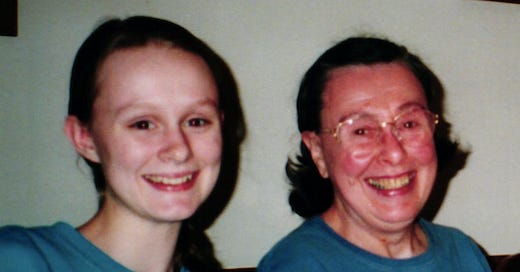Growing Up Backwards
"I’ve been living like I’m a senior citizen for most of my life and tend to find myself fitting in with my grandparents’ peers better than with my own."
When Sari started Oldster, I got excited, even though I imagined that at 32, I wasn’t her target demographic. I’ve since learned that she has a much broader vision for this project than my first impression assumed, but the reason I was excited is that I’ve been living like I’m a senior citizen for most of my life and tend to find myself fitting in with my grandparents’ peers better than with my own.
When I was 15, I was homeschooled and my mom realized I had to get a physical education credit to apply to colleges. Her solution was to ask my grandmother if I could accompany her to her Silver Sneakers jazzercise class at the YMCA.
There’s a good reason for this, but the effect is really interesting to me. I read as an “old soul” (translation: I grew up with abuse in my home), and so I carry with me a caution and a knowing-too-much-ness about people and life that only seems to resonate with those who have lived 60 or more years on this earth. My millennial contemporaries are excited and curious about life in ways that I find puzzling, that makes me reconsider my cynicism. I want to soak up their optimism, but it feels very uncomfortable and unnatural to participate in for very long. I am, after all, a firstborn with a Capricorn rising. I never stood a chance at being carefree.
When I was 15, I was homeschooled and my mom realized I had to get a physical education credit on my transcript if I was to apply to colleges. Her solution was to ask my grandmother, who lived up the street from us, if I could accompany her to her Silver Sneakers jazzercise class at the YMCA. With nine kids, my mom wasn’t free to ferry me around, and I didn’t have my driver’s license yet, so the senior class at the Y it was, meeting at 8 a.m. twice a week. My grandmother drove us in her little black Honda that smelled of unscented lotion and clean vinyl, usually stopping at the library on our way back to drop off her weekly pile of mystery books and pick up more before dropping me back home.
In this class, I found myself the accidental mascot of the group—everyone in the Silver Sneakers crowd was charmed by my presence and wanted to tell me gossip about their week and each other. I was quiet and self-conscious, newly tall and gangly, uncertain what these people wanted from me. But it felt nice to be wanted, and so I would do warm-ups and listen to them, and do paired tension band exercises and listen to them, and hold their feet for sit-ups and listen to them.
One woman, Ari, was this quick-moving, quick-witted French expat with a shock of short, white hair that stood up in a swoop on top of her head, and she took a shine to me. I was, admittedly, obsessed with all things French, and once she discovered this, she spoke to me exclusively in French (much to my delight and utter confusion). Every couple weeks she’d bring me a book or a film in French, demanding that we discuss it when I was finished with it.
In particular, she was obsessed with La Folle de Chaillot, an absurdist satire of capitalism and idealism at odds with each other. She saw herself as la folle, the madwoman, though I was never quite sure why. What I enjoyed about her was her levity, her refusal to take anything quite all the way seriously, her relentless ribbing of me and others. The absurdism in her soul was infectious, and I found myself playing along with her games, seeing situations from her point of view. We were just a group of bodies together in a room a couple days a week, bumbling around and trying to stay strong and flexible.
Once I brought this perspective home with me, it was relentlessly punished. Laughing at the slapstick reality of my father’s abuse and anger got me punished more, which made me laugh more, until I didn’t. Laughing at my peers’ obsessions with crushes and clothes and parties from the distance of my isolation and undiscovered queerness was appropriate, and helped me not fall into obsessions of my own, until I actually cared and felt left out and rejected and cried myself to sleep. I was seeing the world from the distance of age and experience, while simultaneously growing up and figuring out what it meant to have a body and desires.
I now know that detachment alternated with searing moments of presence is dissociation. It’s a trauma symptom, but when I was 24 and newly divorced and hyper-aware of this dynamic as a defining feature of my personality, I called it “growing up backwards.” I had, after all, helped raise five children, escaped a religious cult, started and then ended a marriage, all before my 24th birthday. I felt so old. I still feel so old.
I still get along easily with people much older than me—my weekly date with an octogenarian who’s become a good friend over the last four years is evidence of that…
This is exhaustion, this is trauma. It clouds my vision, keeps me from seeing the world as open before me, and life as long. It keeps me from recognizing that many experiences of love and joy are still being possible for me. But it’s also a superpower: When my peers are going through shit and come to me for support, I’m the one who can help them set things in perspective from my strange remove, if they want it. I’m the one who can help them laugh at their being fired and gas them up for a new job hunt. “Life is long,” I say. And it is. It’s both wonderfully long and exhaustingly long, and I can’t plan much beyond a moment at a time because of trauma-brain, but this too is a blessing and a curse. I’m in it and out of it, all at the same time. Dissociated and present. Naive and oh so exhausted with premature experience.
The more time I spend in therapy, the more time I spend in securely attached relationships, the more time I spend letting myself daydream about possible futures, the less I feel so disconnected from myself and my age and my peers. I’m doing things that feel age-appropriate now, like reconsidering if I still don’t want to have children (surprise, I do want kids!), like writing my first book in my 30s. The rest of my peers have experienced some kind of trauma or another by now, too, which makes it easier for me to relate to them (fortunately/unfortunately). Time is still irrelevant, and I still forget how old I actually am, but it’s less of an extreme sensation than before.
I still get along easily with people much older than me—my weekly date with an octogenarian who’s become a good friend over the last four years is evidence of that—but maybe the trauma that once made me entirely too serious or not serious at all is lessening its grip on me. Maybe as I approach my mid-30s I’m finding an equilibrium with time and self.
Eve Ettinger is a writer and editor in Virginia. They are working on a memoir, and co-host a podcast called Kitchen Table Cult about the intersection of Christian dominionism and current events.







